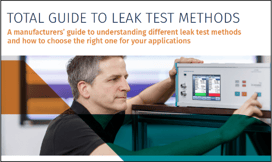Leak testing equipment plays a vital role in ensuring product quality, safety, and compliance across industries, including automotive, medical devices, consumer devices and electronics, and more. However, leak testers and measurement components can naturally experience wear over time which affects proper measurement. This can lead to inaccurate test results and faulty parts leaving your facility.
This is why annual recalibration is recommended (as a standard, though ideal frequency may differ depending on your industry requirements). Some industries are required to maintain regular recalibration procedures as an industry-compliance measure, but regardless, it is a very beneficial, proactive practice that protects your operations, product integrity, and efficiency.
Learn about 5 ways maintaining annual recalibration of your leak test devices can benefit your operations below:
1. Ensure Accurate and Reliable Measurements
Accuracy is the foundation of effective leak testing. Over time, sensors, transducers, and internal components can wear down or drift from their original calibration points due to environmental conditions, usage, or age.
Without recalibration, your system may:
- Fail to detect critical leaks
- Generate false failures
- Compromise test consistency across production batches
Annual recalibration restores your instrument’s precision, ensuring the accuracy and reliability of your leak test results.
2. Maintain Compliance with Industry Standards
In highly-regulated industries, equipment calibration isn’t just a best practice—it’s a requirement. Standards like DAkkS certification, ISO 9001, ISO 17025, etc. require documented proof that instruments are calibrated and traceable to national or international standards.
Annual recalibration provides:
- A calibration certificate for audit purposes
- Traceability to relevant industry standards
- Documentation that demonstrates due diligence
Avoid compliance violations and stay audit-ready with regular, scheduled recalibrations.
3. Avoid Costly Downtime, Scrap, or Recalls
A leak tester that is no longer accurately calibrated can cause many problems on your production line, with issues potentially going unnoticed, leading to:
- Defective parts making it to the end of the line—or worse, out of the factory
- Correctly made parts mistakenly being identified as faulty
- Rework, production delays, or even product recalls
These issues not only impact the cost of production, but can interrupt delivery timelines and damage customer trust. Maintaining regular recalibration helps you catch small deviations before they become costly problems.
4. Maintain Product Quality and Brand Reputation
Product failures due to leaks—especially in critical applications like automotive and medical devices—can have serious safety and performance implications.
Regular calibration ensures:
- Consistent product quality across production runs
- Minimized risk of undetected leaks
- Confidence in your product's performance in the field
Your brand’s reputation depends on reliable performance. Make sure your testing equipment supports that goal.
5. Extend the Life of Your Equipment
Annual recalibration includes an inspection and diagnostic check of your leak testers and measurement devices.
This can uncover:
- Early signs of wear or component degradation
- Sensor drift or performance issues
- Maintenance needs that, if ignored, could lead to costly repairs
You can choose whether you just want a calibration or a comprehensive service including inspection, maintenance and calibration.
By addressing these issues early, you extend the life and efficiency of your equipment, saving money in the long run and reducing the risk of unplanned downtime.
Keep Your Leak Tester Performing at Its Best
At innomatec, we offer both factory calibration and DAkkS-certified calibration services to ensure the accuracy and repeatability of your leak test systems. Whether you’re looking to maintain accuracy, meet compliance requirements, or reduce risk, our team of leak test experts is here to support you - on-site at your facility, or in innomatec’s DAkkS-certified calibration laboratory. Learn more about innomatec’s recalibration services >
Need to schedule your annual recalibration? Contact our calibration lab today!







